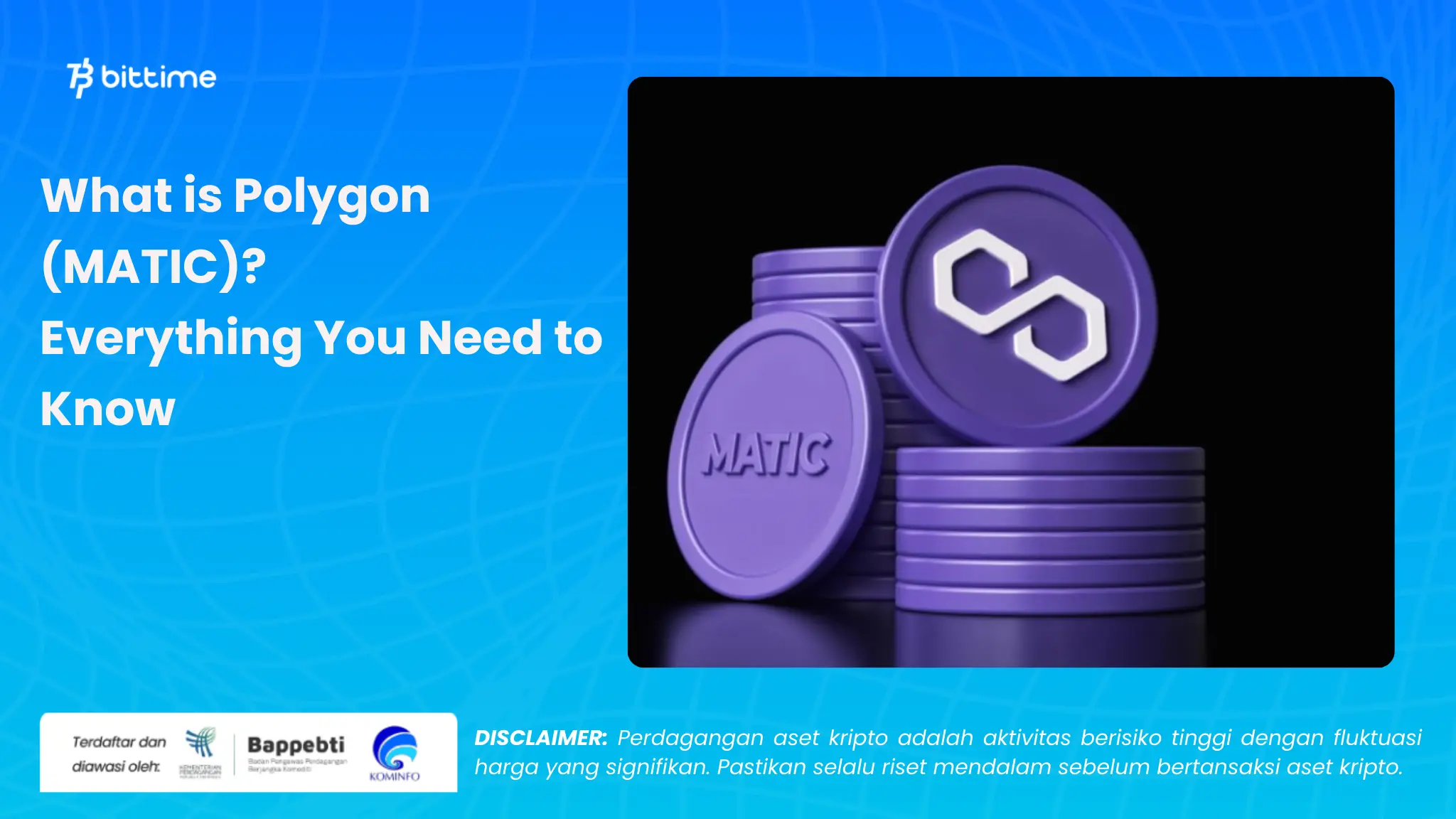What is Polygon (MATIC)? Everything You Need to Know
2024-08-05
Bittime – Polygon (MATIC) is a scaling solution for the Ethereum network that aims to increase transaction speed, reduce fees, and increase the overall capacity of the network.
By providing an easy-to-use framework, Polygon enables developers to build their own blockchains that are compatible with Ethereum.
Here is everything you need to know about Polygon (MATIC).
What is Polygon (MATIC)?
Polygon is the answer to some of the major challenges Ethereum faces today - such as high fees, poor user experience, and low transaction throughput. The platform aims to create Ethereum's "internet of blockchains", that is, a multi-chain ecosystem of Ethereum-compatible blockchains.
They want to achieve this by providing an easy-to-use framework, allowing developers to launch their own custom Ethereum-compatible blockchain with just one click.
Polygon envisions a world where different blockchains can exchange value and information freely and easily, eliminating the technological and ideological barriers that separate most blockchains today.
The project was initially known as Matic Network, but was later changed to Polygon as the scope of the project expanded.
While Matic is a simple layer-2 scaling solution for Ethereum, Polygon is an infrastructure for collaborative blockchain networks that are highly scalable, yet maintain their own sovereignty.
Read Also: Co-Founder of Mechanism Capital: Time to Look for Opportunities to Buy ETH
Who is the Founder of Polygon?
Currently, Polygon is being developed by a multidisciplinary team led by four co-founders, Jaynti Kanani, Sandeep Nailwal, Anurag Arjun, and Mihailo Bjelic.
Kanani is the CEO of Polygon and an experienced developer with an interest in scaling mechanisms, while the rest of the team brings a wealth of experience building, managing, and growing technology companies.
How Polygon (MATIC) Works
Polygon provides a variety of modules that developers can use to easily deploy and configure their own custom blockchain. These include consensus and governance modules, as well as various execution environments and virtual machine implementations.
Blockchains launched this way are configured to benefit from Matic's Proof-of-Stake (PoS) sidechain, which uses a network of validators to dramatically speed up transactions and cut fees to a minimum, while settling everything on the Ethereum mainchain.
Polygon supports two types of chains: stand-alone chains and secured chains. In short, self-chains are self-sovereign blockchains that are directly compatible with Ethereum, whereas secure chains simply bootstrap their security by leveraging a network of professional validators.
Initially, all standalone chains in the Polygon ecosystem will be Matic PoS chains, but sidechains and other enterprise chains will be supported with later updates.
The platform is designed to support a variety of different blockchain scaling mechanisms, including Matic Plasma, zk Rollups, Optimistic Rollups, and Validum Chains - all designed to increase the transaction throughput of the respective blockchain without compromising security or user experience.
Currently, Polygon only supports the Matic Plasma scaling solution (a more viable plasma example). It essentially works by moving transactions from the Ethereum mainchain to the Matic Polygon PoS chain, before settling everything on the mainchain.
In the coming months and years, Polygon will add support for a variety of alternative scaling solutions to give developers the freedom to choose the solution that best suits their needs.
What is (MATIC) Token?
Despite the name change, the native utility token of the Polygon network is still known as MATIC.
It is mostly used to pay gas fees and participate in governance, and can also be used across Polygon's fast-growing DeFi ecosystem.
Uses of Tokens (MATIC)
Here are some uses of the MATIC token.
- Paying gas fees: MATIC is used to pay transaction fees on the Polygon network.
- Staking: MATIC holders can stake their tokens to help secure the network and earn rewards.
- Governance: MATIC holders can vote on governance proposals to help determine the future direction of the Polygon network.
Read Also: What is Polygonscan? Features and Guide on How to Use Them
What Is Polygon 2.0?
Polygon 2.0 is not a direct upgrade to Polygon, but rather a new set of scaling solutions being developed by the Polygon team. This will include:
- ZK Rollups: A layer-2 scaling solution that uses zk-SNARK (zero-knowledge succinct non-interactive argument of knowledge) to prove the validity of transactions without revealing details of the transactions themselves.
- Optimistic Rollups: Another layer-2 scaling solution that assumes that transactions are valid until proven otherwise.
- Stand-alone Chains: Completely separate blockchains with their own security that can communicate with Ethereum via a bridge.
Are MATIC and Polygon the Same?
What is the difference between Polygon and Matic network? Before the project changed its name in February 2021, Polygon was known as the Matic network. The Matic Network has one main offering: plasma sidechains.
Plasma chains are a bit similar to sidechains, except they offer higher security in exchange for convenience. Unlike sidechains, plasma chains publish their “root” on Ethereum layer 1 and function on the assumption that their consensus mechanisms can fail.
This design provides greater security but also makes the chain unable to perform complex operations.
After the project expanded, Polygon chose to maintain the MATIC ticker for its native token. Thus, the Matic network became Polygon.
This name change and subsequent rebranding may cause confusion, but they are both the same project. Polygon is a new umbrella for several projects including the Matic network. However, the Polygon MATIC token is Polygon's native cryptocurrency.
Is Polygon (MATIC) a Good Investment?
Polygon dramatically expands the vision and scope of the original Matic Network project by giving developers a set of tools they can use to create highly scalable, high-performance blockchains and decentralized applications (DApps).
Polygon is unique in the market because it is the only scalability solution that supports the Ethereum Virtual Machine (EVM) and allows connected chains to maintain sovereign security, while ensuring interoperability between each other and the Ethereum mainchain.
Unlike other platforms, chains in the Polygon ecosystem are not forced to utilize security layers as a service, but can still exchange messages with each other thanks to arbitrary messaging capabilities.
This ensures developers can build truly interoperable decentralized applications that can leverage the unique properties of multiple chains at scale.
Because building on Polygon is so similar to building on Ethereum, the platform is immediately accessible to the world's largest blockchain development community, who can now build highly scalable applications that can fully leverage Ethereum's network effects without having to give up anything.
As previously mentioned, Polygon is also unusual in that it has support for a variety of different scaling mechanisms, which a project can implement at its discretion.
This makes it ready if any one scaling solution becomes dominant in the future, or fails to achieve its goals.
Read Also: Solana and Meme Coin Crash: The Impact of Whistleblowers and Hidden FTX Wallets?
How to Buy Polygon (MATIC) on Bittime
You can buy and sell Polygon (MATIC) in an easy and safe way through Bittime. Bittime is one of the best crypto applications in Indonesia which is officially registered with Bappebti.
Polygon (MATIC) available on Bittime with market pair MATIC/IDR. To be able to buy MATIC IDR Of Bittime, make sure you have registered and completed identity verification. Apart from that, also make sure that you have sufficient balance by depositing some funds into your wallet. For your information, the minimum purchase of assets on Bittime is IDR 10,000. After that, you can purchase crypto assets in the application.
Study A complete guide on how to buy Polygon (MATIC) at Bittime.
Monitor graphic movement Polygon (MATIC) price, Bitcoin (BTC), Ethereum (ETH), Solana (SOL) and other cryptos to find out today's crypto market trends in real-time on Bittime.
Disclaimer: The views expressed belong exclusively to the author and do not reflect the views of this platform. This platform and its affiliates disclaim any responsibility for the accuracy or suitability of the information provided. It is for informational purposes only and not intended as financial or investment advice.






